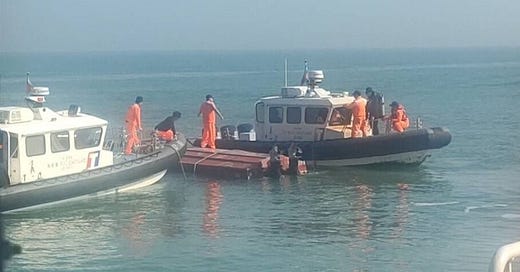China Using Kinmen Drownings to Add Pressure on Taiwan
Unprecedented boarding of cruise ship a new dimension of legal warfare
By: Jens Kastner
The drownings of two Chinese fishermen on February 14 after their boats capsized when chased by Taiwan’s coast guard in waters surrounding Taiwan’s frontline island of Kinmen appear set to further erode Taiwan’s sovereignty to the benefit of China’s territorial claims. The incident occurred in an area that China has for decades tacitly recognized as “prohibited or restricted” for Chinese vessels, but China’s Taiwan Affairs Office on February 17 stressed that there has never been such a thing as a “prohibited or restricted” zone.
China's coast guard, which announced it would regularly patrol the waters near Kinmen in the wake of the drownings, in an unprecedented move on February 19 boarded a Taiwan cruise ship near Kinmen to check the crew, causing political observers in Taipei to fear a new dimension of legal warfare and “salami slicing,” policies that incrementally improve China's foreign policy position. This practice mix has proven highly effective for China in increasing its de facto control in the South China Sea in waters previously controlled by the Philippines as well as in the Taiwan Straits where military crossings of the middle line that had formerly been recognized as a tacit border are now occurring on the daily basis.
The incident occurred, according to the Taiwanese coastguard, when the fishermen’s speedboat was found trespassing into prohibited waters off Kinmen. When the Taiwanese authorities sought to apprehend them, the boat capsized and its four occupants fell overboard. Although coast guard personnel sought to rescue the four, only two survived.
“We are highly concerned about whether China will use this maritime conflict to engage in legal warfare and a war of attrition, as for China, the purpose of the legal battle is to make the Taiwan Strait an ‘inland lake’ and become the scope of application of Chinese law,” said Shen Yu-chung, a political science professor at Tunghai University in Taichung, in an interview with Asia Sentinel. “This is like Chinese fighter jets flying over the center line, causing pressure on Taiwan's coast patrols and creating a ‘new normal.’
Shen called on the Taiwanese government to appeal to countries that have the same kind pressure, such as Japan, Vietnam, and the Philippines. These countries, he said, should be worried about the Kinmen Sea now becoming a successful model for China’s gray zone tactics, as it may further undermine the status quo of the Japanese-controlled Senkaku Islands in the East China Sea and the Vietnamese and Philippine-controlled areas in the South China Sea.
There are no offensive weapons on Kinmen, and there has for decades been a lot of intermarriage between Kinmen residents and those of adjacent Fujian Province, making it a gray zone tactic that is safe for China to exploit. The Kinmen drownings represent the near-certain outcome of Taiwan recording an ever-increasing number of trespassing Chinese fishing vessels and sand dredgers around its frontline islands. The Taiwanese authorities found that many of these ships did not have names or registry information and engaged in dangerous maneuvers to evade them. In April 2023 residents of Taiwan’s other frontline island, Matsu, had their only two internet cables supposedly accidentally cut by a Chinese fishing vessel and a Chinese cargo ship.
Denny Roy, an expert on Taiwan’s political history and a senior fellow at the US-based East-West Center think tank, said that the latest developments are reminiscent of China commencing regular law enforcement patrols along the Mekong River after the murders of the crews of two Chinese commercial vessels in 2011 by local gangsters. About 140 of these patrols have been carried out since, effectively expanding the reach of China’s judiciary far beyond its borders.
“Kinmen is a liability for Taiwan, but unfortunately one that Taiwan is stuck with,” Roy said. “China can take an initiative at a time of its own choosing using Kinmen as a means of increasing pressure on Taiwan, for example by stealing sand or intentionally cutting an undersea internet cable.”
Judging from what Chinese propaganda influencers are saying about the Kinmen drownings, Taiwan is facing even bigger pressure from a propaganda machine that is cranking up to use the incident to China’s advantage. Irene Lee, a Chinese commentator, recommended the use of "folk methods" involving thousands of fishing boats demonstrating at sea surrounding Kinmen, holding up photos of the deceased and demanding severe punishment of the murderer.
“Thousands of people can also accompany the families of the deceased to Kinmen, set up tents there and take turns to sit in meditation,” Lee wrote.
A man using the name Sasha – both in English and Russian Cyrillic – and claiming to be a Chinese paratrooper, asserted that the Chinese fishermen must have been accidentally killed by the Taiwan Coast guard because, he said, they were good swimmers, knew the waters well, and the local weather was fine that day. He believes that the Taiwan coast guard used non-lethal weapons against the men, so that they lost consciousness and, hence, drowned.
“This murder happened during the Spring Festival of the Year of the Dragon, and those who kill Chinese must be killed no matter how far away they are,” he said. “Can the Communist Party hold this group of people accountable? Yes, they can with facial recognition. Taiwan is the territory of the People’s Republic of China, and the mainland legal experts should come forward now to discuss how the case should be filed.”



